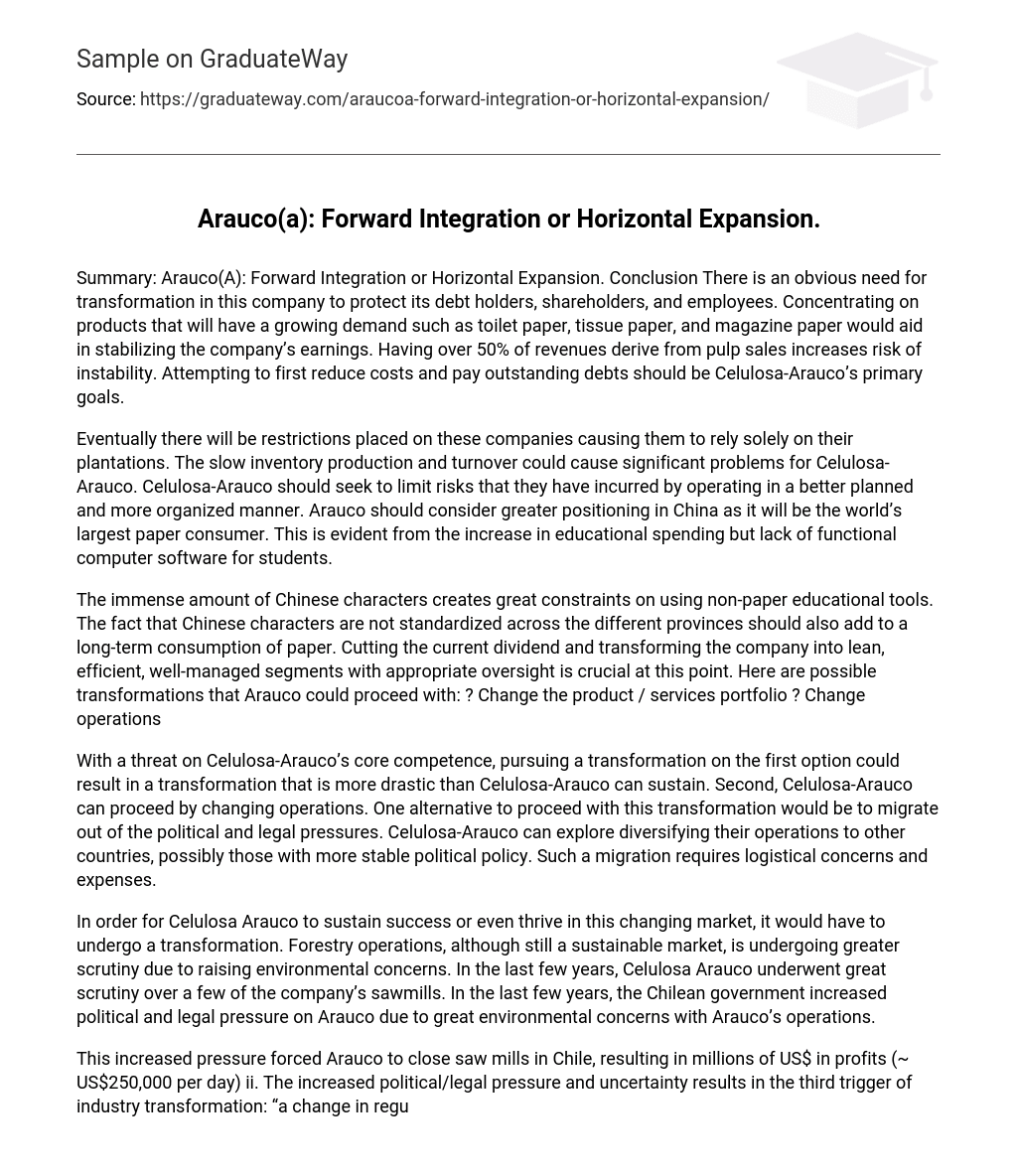Summary: Arauco(A): Forward Integration or Horizontal Expansion. Conclusion There is an obvious need for transformation in this company to protect its debt holders, shareholders, and employees. Concentrating on products that will have a growing demand such as toilet paper, tissue paper, and magazine paper would aid in stabilizing the company’s earnings. Having over 50% of revenues derive from pulp sales increases risk of instability. Attempting to first reduce costs and pay outstanding debts should be Celulosa-Arauco’s primary goals.
Eventually there will be restrictions placed on these companies causing them to rely solely on their plantations. The slow inventory production and turnover could cause significant problems for Celulosa-Arauco. Celulosa-Arauco should seek to limit risks that they have incurred by operating in a better planned and more organized manner. Arauco should consider greater positioning in China as it will be the world’s largest paper consumer. This is evident from the increase in educational spending but lack of functional computer software for students.
The immense amount of Chinese characters creates great constraints on using non-paper educational tools. The fact that Chinese characters are not standardized across the different provinces should also add to a long-term consumption of paper. Cutting the current dividend and transforming the company into lean, efficient, well-managed segments with appropriate oversight is crucial at this point. Here are possible transformations that Arauco could proceed with: ? Change the product / services portfolio ? Change operations
With a threat on Celulosa-Arauco’s core competence, pursuing a transformation on the first option could result in a transformation that is more drastic than Celulosa-Arauco can sustain. Second, Celulosa-Arauco can proceed by changing operations. One alternative to proceed with this transformation would be to migrate out of the political and legal pressures. Celulosa-Arauco can explore diversifying their operations to other countries, possibly those with more stable political policy. Such a migration requires logistical concerns and expenses.
In order for Celulosa Arauco to sustain success or even thrive in this changing market, it would have to undergo a transformation. Forestry operations, although still a sustainable market, is undergoing greater scrutiny due to raising environmental concerns. In the last few years, Celulosa Arauco underwent great scrutiny over a few of the company’s sawmills. In the last few years, the Chilean government increased political and legal pressure on Arauco due to great environmental concerns with Arauco’s operations.
This increased pressure forced Arauco to close saw mills in Chile, resulting in millions of US$ in profits (~ US$250,000 per day) ii. The increased political/legal pressure and uncertainty results in the third trigger of industry transformation: “a change in regulation can alter the mix of buyer value and cost that companies are permitted to offer”. However, there’s no indication of an urgent matter with the environmental concerns. Celulosa-Arauco would not be able to sustain success if they continue to just suspend or close saw mills as that results in loss of profits and investment.
If the concerns grow and political / legal pressures escalate, this could prove fatal to Celulosa-Arauco. Resources I “Celulosa Arauco: Forward Integration or Horizontal Expansion? ” ii Celulosa Arauco Annual Report 2006; http://www. arauco. cl/pdf/Arauco20-F_2006. pdf iii “Industry Transformation”; Michael E. Porter and Jan W. Rivkin; 2000; Harvard Business School Reprint 9-701-008 iv “Leading Change: Why Transformation Efforts Fail”; John P. Kotter; 2006; Harvard Business School Reprint R0701





